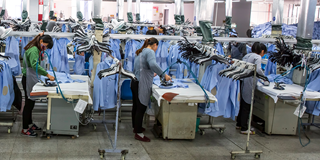After a year of turmoil for globalization, new efforts are underway to gain a better understanding of the dynamics of international trade and evolving technologies. Armed with empirical studies and reasoned proposals, policymakers around the world can start to ensure that these two key engines of economic growth work for everyone.
WASHINGTON, DC – One positive outcome of the trade tensions of recent years is a renewed interest in understanding how trade actually works, in terms of aggregate gains, distributional effects, adjustment costs, and other factors. Governments are increasingly looking for ways to mitigate the negative effects of trade through labor-market policies and broader interventions, and scholars are generating a new wealth of knowledge that could make globalization work for everyone, provided the significant trade-policy risks looming on the horizon are addressed.
To borrow the title of a 1982 Australian film, 2017 will probably be remembered as the year of living dangerously, at least in terms of globalization. Trade policies around the world are under intense scrutiny, and the open, rules-based trading system is being threatened by protectionist pressures in key advanced countries. How the international system will fare remains to be seen. But it is clear that we can no longer count on business as usual.
To navigate today’s uncertainty, it helps to examine trade dynamics “behind the headlines,” which was the theme of the World Trade Organization’s Public Forum 2017. Populist rhetoric notwithstanding, there is strong evidence to suggest that trade boosts incomes and living standards, by increasing productivity and reducing prices for firms and consumers. And this is true in both emerging and advanced economies.

WASHINGTON, DC – One positive outcome of the trade tensions of recent years is a renewed interest in understanding how trade actually works, in terms of aggregate gains, distributional effects, adjustment costs, and other factors. Governments are increasingly looking for ways to mitigate the negative effects of trade through labor-market policies and broader interventions, and scholars are generating a new wealth of knowledge that could make globalization work for everyone, provided the significant trade-policy risks looming on the horizon are addressed.
To borrow the title of a 1982 Australian film, 2017 will probably be remembered as the year of living dangerously, at least in terms of globalization. Trade policies around the world are under intense scrutiny, and the open, rules-based trading system is being threatened by protectionist pressures in key advanced countries. How the international system will fare remains to be seen. But it is clear that we can no longer count on business as usual.
To navigate today’s uncertainty, it helps to examine trade dynamics “behind the headlines,” which was the theme of the World Trade Organization’s Public Forum 2017. Populist rhetoric notwithstanding, there is strong evidence to suggest that trade boosts incomes and living standards, by increasing productivity and reducing prices for firms and consumers. And this is true in both emerging and advanced economies.